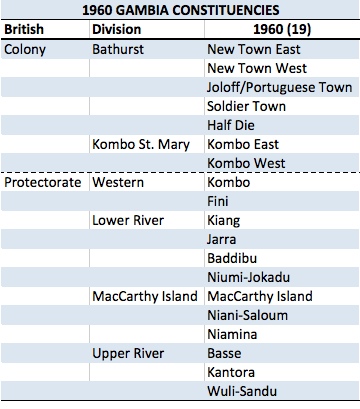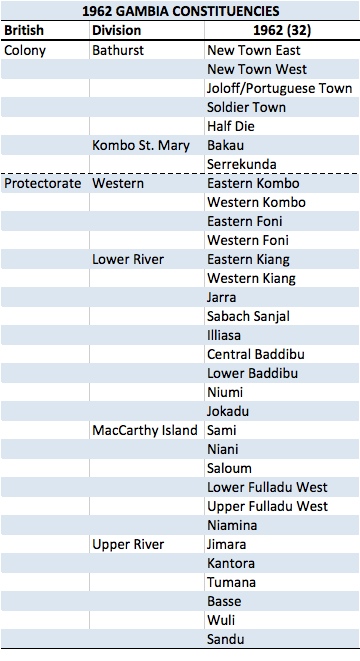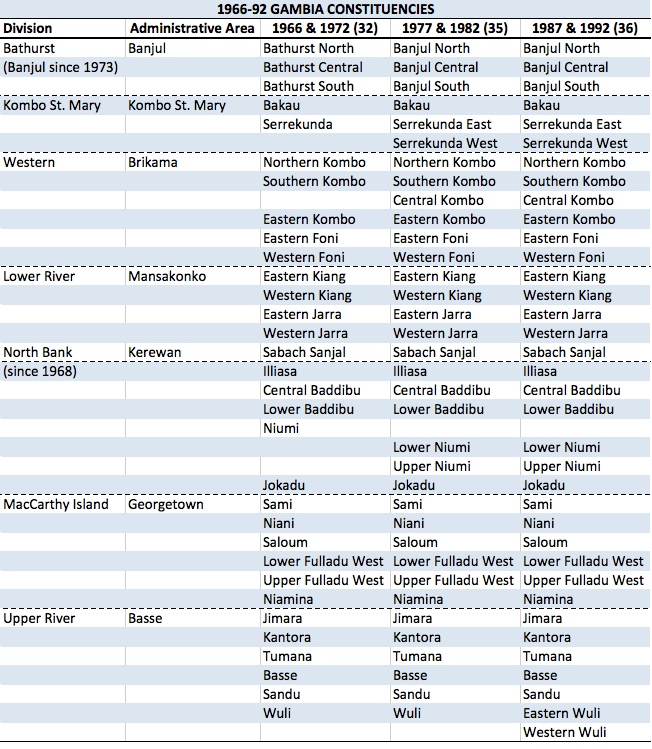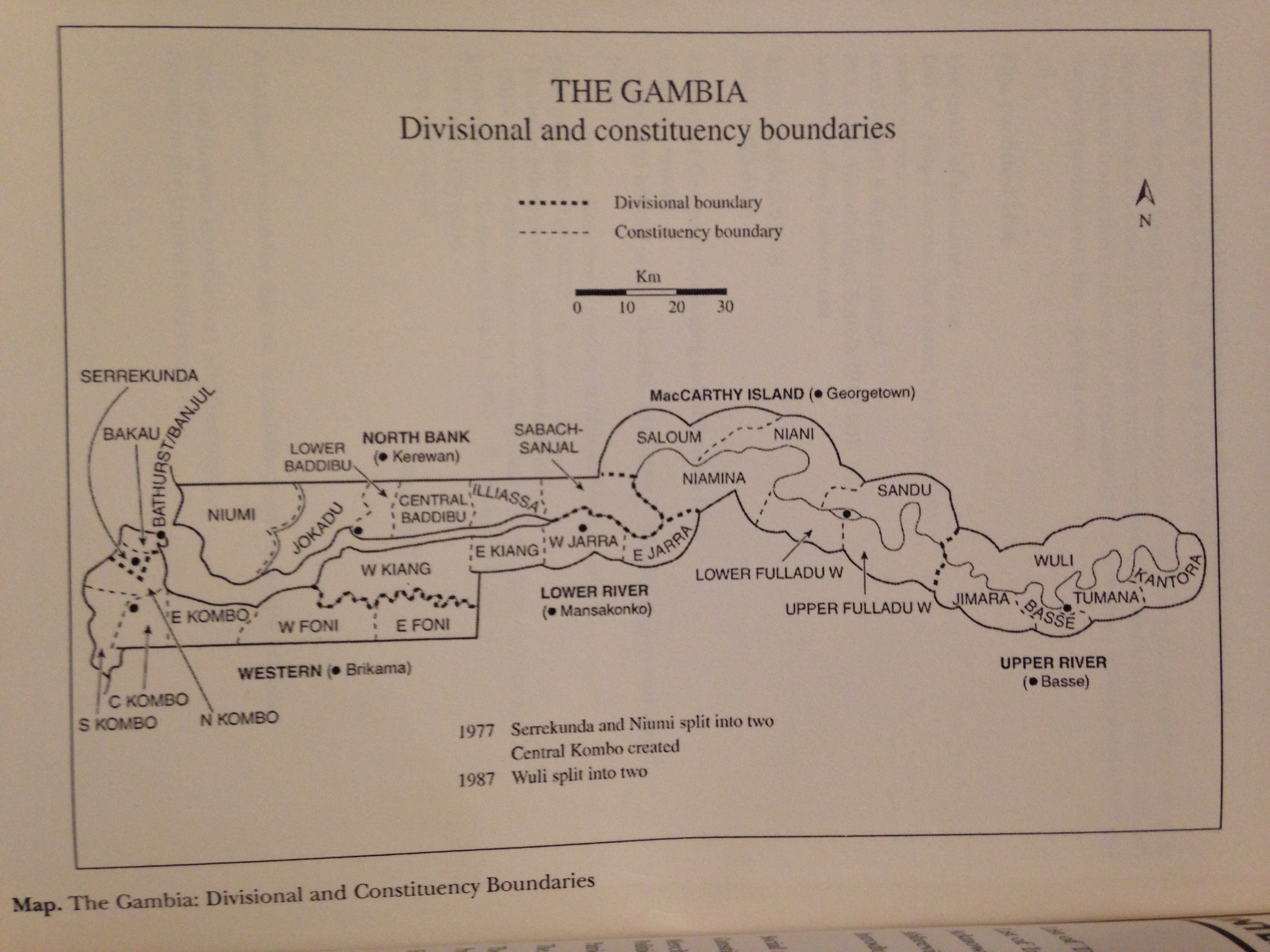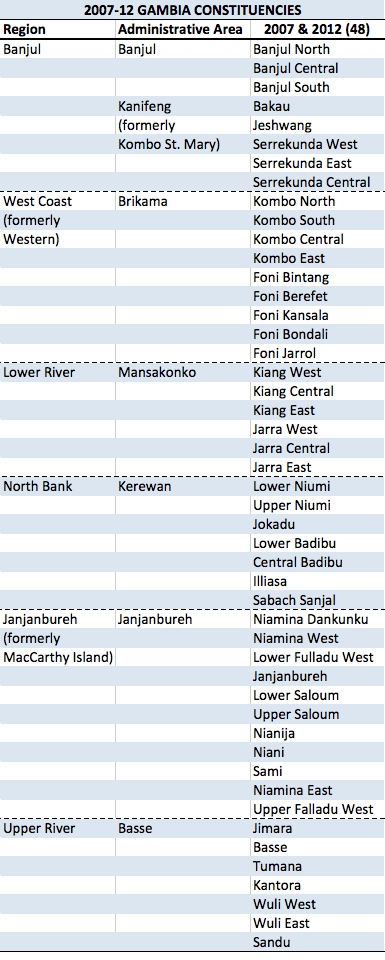The Gambia has consistently used the single-member plurality system to elect MPs since 1960. Additionally, there have been MPs who were appointed due to their status as chief as well as MPs indirectly elected by other chiefs. Finally, there are MPs who lack voting rights because they were appointed either by the Governor General or the President.
Gambians vote by placing a marble in the voting drum of the appropriate candidate:
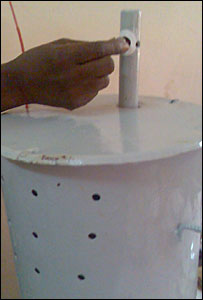 Casting a Vote by Placing Marble in Voting Drum
Casting a Vote by Placing Marble in Voting Drum
 Counting Ballots Using Wooden Blocks with Holes
Counting Ballots Using Wooden Blocks with Holes
The table below shows the various methods of election or appointment of MPs since 1960:

Until independence in 1965, The Gambia was divided into the Colony, essentially the capital region, and the Protectorate, upriver from Bathurst (now Banjul).
Gambia 1 (1960): 27 seats with 19 directly elected and 8 appointed by the Governor due their status as chiefs in the Protectorate.
The following table lists the 19 constituencies with direct elections:
Gambia 2 (1962): 40 seats with 32 directly elected and 8 appointed by the Governor due their status as chiefs in the Protectorate. This electoral system is differentiated from the former due to the significant expansion of the legislature.
The following table lists the 32 constituencies with direct elections:
Gambia 3 (1966): 36 voting MPs with 32 directly elected. This electoral system was differentiated from the previous one because The Gambia became independent in 1965. Four voting MPs were elected indirectly by chiefs. Additionally, two non-voting MPs were appointed by the Governor General or the advice of the Prime Minister. The attorney general also served as an ex officio MP.
1963 Election Act, Amended to 1969
Gambia 4 (1972-92): 36 voting MPs in 1972; 39 voting MPs in 1977; 40 voting MPs in 1982; and 41 voting MPs in 1987 and 1992. This electoral system was differentiated from the previous one due to The Gambia becoming a Republic with a President. In 1966, 1972, and 1977, four voting MPs were elected indirectly by chiefs. That number increased to five for 1982, 1987, and 1992. Additionally, 3 non-voting MPs were appointed by the President in 1972. That number rose to 4 in 1977, and 8 in 1982, 1987, and 1992. The attorney general also served as an ex officio MP.
The following table lists the constituencies used from 1966 through 1992.
The following map shows the constituencies from 1966 with mentions of updates from 1977 and 1987.
Source: Arnold Hughes and David Perfect, A Political History of the Gambia, 1816-1994 (Rochester, NY: University of Rochester Press 2006), vi.
1994 Constituency Boundaries Commission’s Order
1994 Constituency Boundaries Commission’s Report
1996 Elections Decree
Gambia 5 (1997-): 45 voting MPs in 1997; 48 voting MPs in 2002, 2007, and 2012; and 53 voting MPs in 2017. This electoral system was delineated from the previous one due to the significant increase in the size of the legislature. Four MPs without voting rights were also appointed by the President in 1997. Their number increased to five beginning in 2002. Chiefs no longer serve in Parliament. Nor is the attorney general still an ex officio MP.
The following table shows the constituencies in 2007-12; they were likely also used in 2002. Information on the constituencies used in 1997 is not available.
The following table shows the constituencies for 2017:

Sources: Arnold Hughes and David Perfect, A Political History of the Gambia, 181-1994 (Rochester, NY: University of Rochester Press 2006); Petra Bendel, “Gambia” in Elections in Africa: A Data Handbook, eds. Dieter Nohlen, Michael Krennerich, and Bernhard Thibaut (New York: Oxford University Press 1999), 411-22; David Perfect and Arnold Hughes, “Gambian Electoral Politics: 1960-2012” in eds. Abdoulaye Saine, Ebrima Ceesay and Ebrima Sall, State and Society in The Gambia Since Independence, 1965-2012 (Trenton, NJ: Africa World Press 2013), 79-122; African Elections Database; Independent Electoral Commission of The Gambia.



